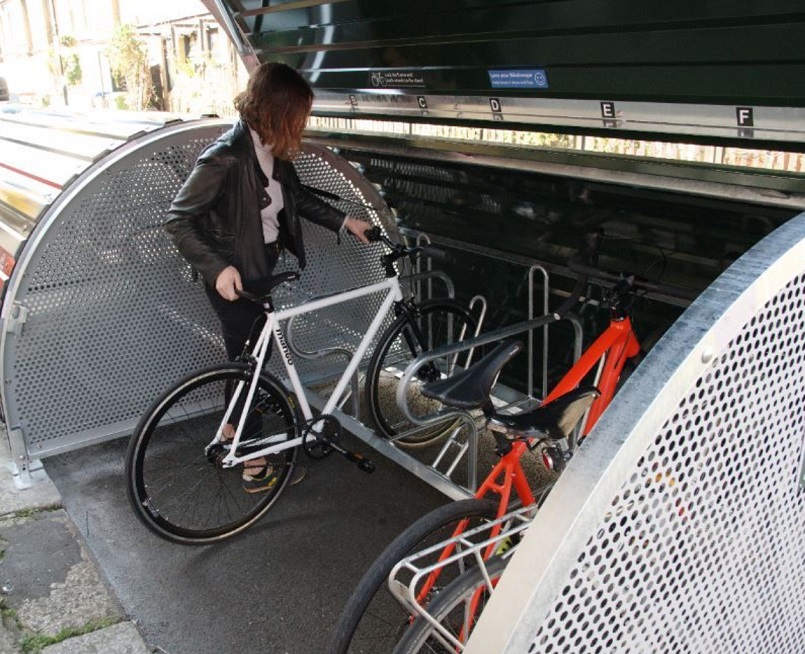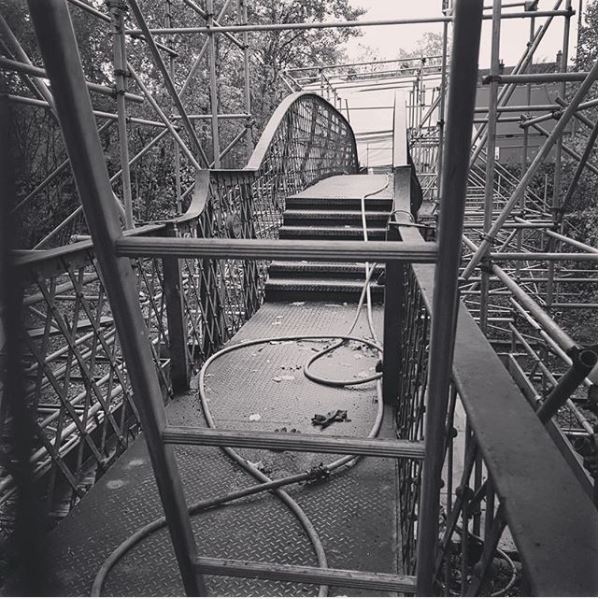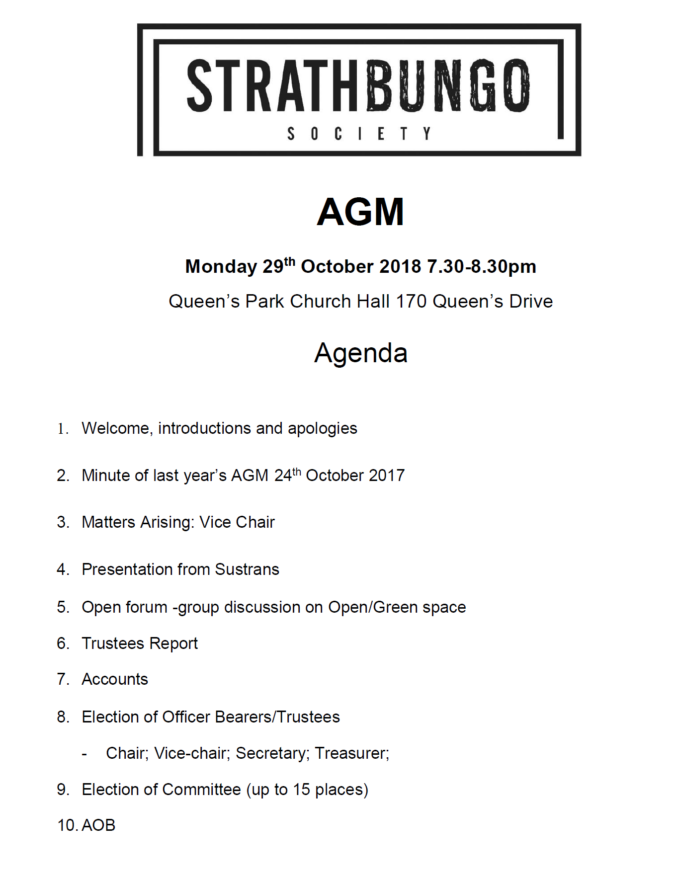This morning the Strathbungo Society received the welcome news that Network Rail’s proposed tree works on the Glasgow – E.Kilbride line won’t start this weekend. Nicola Sturgeon, our MSP, had earlier in the week secured agreement from Network Rail that they would meet with the Strathbungo Society. We asked her then to clarify whether Network Rail would suspend any work until we had a chance to negotiate and she has received the following reply from the Network Rail Communications Manager: “I have spoken to the project team and can advise that we won’t be doing any work for now on the stretch of railway between Nithsdale Road and Crossmyloof station.”
Continue reading
Author: Nick Kempe (Page 2 of 5)
(Statement from Fiona Mackinnon on behalf of the Strathbungo Society)
Network Rail are planning to cut down every tree along the 11 miles of track between East Kilbride and Glasgow Central. Their timetable starts in September i.e . now. When the chainsaws and giant chippers plan to arrive to work all night in Strathbungo, we do not know.
The Chair, Treasurer and Secretary of the Society and a number of local residents went along on Monday night to Network Rail’s ‘drop-in information’ session but came away shocked by the potential scale of destruction planned but also by the lack of detail from Network Rail about what they will do and when. Most importantly there was no real explanation why.
Continue reading

Each locker can take 6 bikes
Glasgow City Council are consulting on the introduction of “bread bin” type cycle storage lockers on streets to encourage more people to cycle (see here). There is a questionnaire that can be accessed through the link. After asking some information about respondents, such as whether you own a bike, there are two key questions. Whether you are in favour of on street secure cycle storage, even if this means a loss of parking spaces, and how much you would people be prepared to pay. £1.50 a week is being mooted which seems a lot when car parking is free.
The Strathbungo Society has previously discussed on street secure cycle storage, particularly for the Nithsdale Rd/St/Lane area, as part of the Pollokshields Charrette. The general view is that it could make a big difference for people staying in tenement flats, not just in terms of saving space but also saving people from lugging bikes up stairwells. That is not to say other streets might not be interested. We would like to hear what you think, particularly if you respond to the consultation or would be interested in using a bike box. If enough people are interested we can facilitate a meeting and help make the case to the Council that Strathbungo should be included in the initial trial.
I have offered to act as contact for this until we get a “bike officer” on the Committee! You can contact me at treasurer@strathbungo.co.uk
The Network Rail Project Manager has provided the Strathbungo Society with an update on the footbridge works and apologised for the delay. The construction programme will now extend until 19th February 2019 and the footbridge will remain closed until then.
What’s happened is that significant structural defects, which had been hidden by many years of debris/gunge etc, were revealed during the process of cleaning and steelwork preparation. Specifically, far more corrosion was found beneath the Durbar plate deck than predicted. The deck is double layered and it appears was simply over plated at some point in the past. Network Rail made allowances for the corrosion beneath the deck but not to anywhere near the extent they have uncovered. As a result they now need to remove and renew the entire deck.
The good thing is that corrosion has been caught before it got any worse.
Strathbungo Society Trustees Report Year ended 30 April 2018 were approved at the AGM and are being submitted to the Office of the Scottish Charity Regulator.
AGMs play a vital democratic function. In the Strathbungo Society’s case it helps ensure we remain accountable to all of you in the local community whom we represent and is also an important means of enabling new people to get involved – without this, the Society and all the events we organise would not happen. So, please think seriously about coming along to our AGM (details below).
We try to make our AGM as informative and enjoyable as possible. It provides plenty of opportunity for people to contribute – we want your ideas – besides offering tea, coffee, a glass of wine and a chance to meet other people living in the area. This year we have arranged a speaker from Sustrans, who are leading the work on the South City Way (see here) – an opportunity to talk about other ideas for improving walking and cycling links on the southside. We will also have small group discussions about local Green Space, focusing on Queen’s Park – Glasgow City Council is currently consulting about its Open Space Strategy (see here), which is essential for everyone’s quality of life. We would like to feed your ideas and views into that with the aim of improving what we have currently.
The formal business consists of consideration of
- Unapproved minutes of 2017 AGM
- 2017-2018 Trustees Report and Audited Accounts
- 2017-18 Accounts
- 2018 Examiners Report
- Elections of Officers & Committee
The four office bearers act as Trustees for the Charity and report to the Office of the Scottish Charity Regulator each year. We are looking for at least one new Office-Bearer, to replace our current Chair, Kevin Kane who is standing down – as he had intended to do last year – and also for new Committee Members.
The formal agenda is set out above.
If you have any questions before the meeting please contact chair@strathbungo.co.uk or treasurer@strathbungo.co.uk.
The Strathbungo Society agreed last year to affiliated to the Alexander Thomson Society and, for those who are interested, there is lots of information in their New Year message about what they do. “The renowned architect Alexander “Greek” Thomson designed 1-10 (Moray Place), and lived at No 1. He did not design any further buildings in Moray Place or the Squares, however, although the Titwood Place and Salisbury Quadrant tenements in Nithsdale Road and Nithsdale Drive were probably built to his design.” (http://bygone.bungoblog.com)
New Fire and Rescue Plans are being adopted across Scotland and a consultation on Glasgow’s is open until the 10th December (see here for all documents and online response form). As a member of the Glasgow Community Planning Partnership the Society was consulted and considered the plan at our last meeting. The response we submitted is pasted below and raises points about the provision of fire stations, access to the back lanes, the implications of the Grenfell fire disaster and fire safety in conservation areas.
The committee is keen to engage in more consultations in future and would welcome any feedback people may have.
Strathbungo Society response to Local Fire and Rescue Plan for the City of Glasgow
The Strathbungo Society is delighted to have been asked to respond to this plan and more particularly that the Fire and Rescue Service is consulting local communities about the role of the Fire and Rescue Service.
We believe there are many positive proposals to the plan and are particularly pleased to see that the Fire and Rescue Service is keen to join up what it does with other services and make the most of the resources it has. Two excellent examples of this are the proposals for how the Fire and Rescue Service could assist with responses to cardiac arrest in the city and how, when making fire safety checks, staff could also help people, particularly older people, identify other hazards in the home. This is sound joined up thinking.
We have four major concerns about the plan.
- The Plan says nothing about the provision of fire stations in Glasgow. We are concerned that the success the fire brigade has had in reducing the impact of fires (eg domestic fire safety) and therefore reduction in demand could lead to demands or proposals to reduce the number of fire stations in the name of efficiency. We accept efficiencies should be considered but from a community perspective, knowing that the fire and rescue service is there – even if never called upon – not just for fires but for major emergencies is one of the foundations for community safety and we do not think that should be reduced in any way. Far better the fire service extends the way it uses its resources (as in proposals above to extend its role) than to cut them.
- The Fire and Rescue service should review how it best services effective access to Strathbungo’s / Glasgow’s narrow streets and lanes. A recent bin fire in the lanes behind Moray Place / Regent Park Square was inaccessible to the fire engine that attended. More than one car was parked and blocking the entry to the lane from Nithsdale Road. Luckily the fire was not too far down the lane, so the fire officers were able to run a hose to the blaze and extinguish it. The incident could have been a far worse. However, it illustrates two problems; one the public safety issue of vehicles blocking entrances to lanes which could be addressed by council traffic and parking control. Traffic wardens are rarely seen in the area so making sure the area is on their radar would be a first step. (a matter for the Police?); Secondly the possibility for the Fire Service to consider the use of smaller fire engines / vehicles to allow it to effectively attend via narrow roads and tenement back lanes, of which there are many right across Glasgow and Scotland’s major cities and towns. This issue is similar to that faced by the City Council’s cleansing services who now provide smaller vehicles to undertake the service rather than much larger vehicles.
- We are surprised that there is absolutely no mention of the Grenfell Fire and the implications this has for fire safety in the city, particularly when we know there has been extensive survey of buildings which it is reasonable to expect the fire service to take a view on. The commitment in the plan to “Working in partnership to ensure the appropriate provision of fire safety standards are incorporated in new premises under construction or premises undergoing material changes” does NOT go far enough. Some buildings need to be improved whether other material changes are happening or not. We would like to see the fire service actively developing and arguing for further fire safety measures in a range of buildings across the city and part of this should be the retrofitting of sprinkler systems into tower blocks and public buildings that so far lack them. In addition, this could also usefully include a new policy of paid-for fire safety checks of Airbnb properties, particularly where these are in effect operating as short-term lets and other non-statutory forms of multiple occupation.
- How the Fire and Rescue service best promotes fire safety in tenement, terraced and Conservation Areas. We believe the Fire and Rescue Service has an important role to play in finding solutions to how modern fire safety measures can be made compatible with conservation objectives and in traditional tenement and terrace properties. For example, the requirement for fire doors in some properties has resulted in the removal of fine old wooden doors. We cannot see why doors cannot be created which meet both fire safety requirements and reflect the character of the original architecture. Similarly, Victorian houses / flats are poorly insulated by modern standards, and there are risks that in addressing this private and third sector operators may be using unsafe materials / methods (as in Grenfell fire) or else the materials and the way they are used destroy the character of the house. Therefore, we would like the fire service to consider its role in relation to wider objectives such as ensuring the fire safety of tenements and terraced houses in conservation areas – such as Strathbungo and Pollokshields – and its role in reducing fuel poverty.
Other comments we would make are:
- We agree with the analysis that much deliberate fire setting is of rubbish and fly tipping. A contributory factor to this has been the failure of Council refuse services to clear bulk items timeously (or at fixed times) with the result that items can lie on the streets or back lanes for prolonged period, in fact weeks. A proportion of these are then set alight. We would request therefore that the fire service adds its voice to local communities in making the case for improved refuse and especially bulk uplift collection.
- We also recognise that risks of fire within houses is likely to increase due to the forecast increase in numbers of people with dementia and the numbers of people with dementia living at home and these risks may further increase due to the escalation in mental health problems within society. This causes great concern for relatives and neighbours and we believe the fire service has a key role in developing effective preventive measures and besides sitting on Community Planning Partnerships needs to be at the table for Health and Social Care Partnerships.
- We understand the Fire and Rescue service shares our concern about misuse of fireworks. They have highlighted the practical difficulties of a ban on retail sales but seek their agreement in principle to support a community-wide initiative to explore a solution based on legislation and a programme of social interaction to address the causes
We welcome the commitment of the Fire and Rescue service to our local area partnerships in Glasgow and believe the issues we have highlighted here provide many good reasons why the Fire and Rescue Service should spend time interfacing with other services and local communities.
The Strathbungo Society is a registered charity and has to produce annual reports and financial statements that meet the requirements of the Office of Scottish Charity Regulator. The Report from Trustees for the year from 1st May 2016 to 30th April 2017 and the Independent Examiner’s Report on the financial statements were approved at the AGM held on 24th October 2017. They can be read or downloaded by clicking the links.
© 2025 The Strathbungo Society
Theme by Anders Norén — Up ↑










 #b
#b














Recent Comments